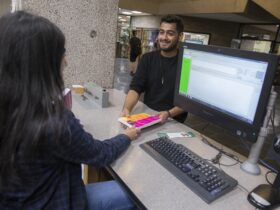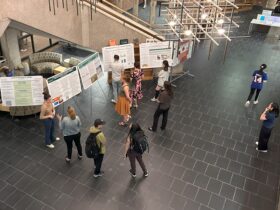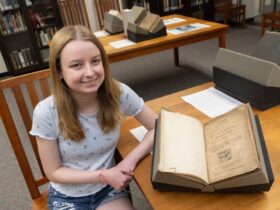Immigrants Wake America begins with the voice of Kathryn Lloyd, Senior Director of Programs at the Tenement Museum in New York City talking about the complexities of individual stories and how quickly they can grow into complicated histories of family and politics. “When we’re looking at the story of one person, or one family and how that family has changed over time you see how the United States has changed over time.” Immigrants Wake America is a podcast produced and hosted by Shruti Jain and Le Li, PhD candidates in English and Translation Research and Instruction Program (TRIP) at Binghamton University and executively produced by Dr. Lisa Yun, Associate Professor in the English Department at Binghamton University, and Kathryn Lloyd. In response to the growing violence and hate speech towards immigrants in the US, especially towards immigrant women, Shruti Jain and Le Li created the podcast in which storytellers share their family histories of migration and the centrality of women in their lives. As Jain and Li state, “storytelling allows us to find similarities and differences between ourselves and others, thus offering a humanizing counterpart to harmful narratives.” Taking that thread and growing it into a podcast, however, takes a lot of work from conceptualization to their listeners being able to press ‘play’.
Jain and Li find their storytellers through the Tenement Museum’s digital exhibit, Your Story, Our Story. The exhibit, which is cofounded by Kathryn Lloyd and Annie Polland, is a digital archive of self-submitted pictures and stories about objects, memories, and traditions related to the contributors’ ancestors or the contributors themselves. The images include pictures of food, jewelry, clothing, furniture and toys. Jain and Li spent months scrolling through the exhibit looking for keywords or themes to center an episode around. They then worked closely with Dr. Lisa Yun and Kathryn Lloyd to reach out to storytellers, introduce the podcast, and ask if they would be willing to share their story. Jain and Li then meet with their storytellers before recording so everyone feels comfortable and gets used to talking before introducing the technology.

While the technology side of the project may seem the most daunting to some, being responsible for the voices and stories of their guests is paramount to Jain and Li. As Jain and Li pass episodes back and forth during the editing phase they also involve their storytellers in the process ensuring they are comfortable with the way their stories are voiced. As Jain states “It’s the editing that takes the most time” and is where the bulk of the work happens. Editing interviews give Jain and Li the opportunity to highlight particular stories or moments. However, finding the balance between maintaining the storyteller’s control of their story without getting carried away with their own ‘storytelling’ is difficult. Inviting storytellers to be involved throughout the process helps maintain their control over their own stories and how they are finally presented in the episodes.
Hearing stories spoken by storytellers in their own voice is at the heart of the podcast’s purpose. The differences in accents, tones and dictions in the podcast add an audible layer to stories being told and personalize them more. The hosts take inspiration from Dr. Jennifer Stoever’s work The Sonic Color Line and also find that “sound frequently appears to be visuality’s doppelgänger in U.S. racial history”.1 Combining the images from the Your Story, Our Story archive with the podcast creates an extra dimension of sound to the stories being shared. Through that sound, the hosts emphasize the goal of the podcast is for listeners to recognize their family’s migration histories and reconsider the definition of “immigrant.” Many might associate the term “immigrants,” with “new immigrants” or Asians or Latinx. But in fact, most “Americans,” except Native Americans, are related to “immigrants.” Jain and Li hope that when listeners hear voices telling histories similar to their own they recognize their, or their family’s immigrant lives. The hosts hope that this recognition, in turn, helps combat the anti-immigrant rhetoric on the rise in America today.
The second storyteller in the podcast’s first episode is Dr. Lisa Yun. Dr. Yun talks about her own experience with storytelling and the allure of stories in general. “It’s through stories that we make sense of life and that we connect with others and we grow.” An important aspect of storytelling is sharing those stories with others. Immigrants Wake America helps share the experiences of immigrants and migrants, old and new, connecting them with each other showing their similarities and bringing more awareness and understanding of their stories to the podcast’s audience.
In a recent exhibit featuring the podcast held in the University Union on Binghamton’s campus, storytellers, collaborators, listeners and hosts all gathered to converse and share together. The exhibit showcased the Your Story, Our Story images and stories shared to the archive and on the podcast. The episodes were playing throughout the event giving people the opportunity to listen in and connect voices to images and people. Dr. Yun spoke at the event focusing mostly on thanking the crowd of collaborators in the room that included present and past students, the podcast hosts, those working at the Tenement Museum, campus members including those from the library and the Center of Civic Engagement and the storytellers themselves. The event fully captured the multi-layered and multi-faceted project brought together by a community of collaborators willing to share their histories and work together to sound them out.
Immigrants Wake America is available for listening through The ORB, Binghamton Libraries’ Open Repository, Spotify, Audible, Google podcasts, Apple podcasts and Amazon Music. Episodes are also available for listening directly on the Immigrants Wake America website that includes links to the storytellers’ Your Story, Our Story posts. The podcast is created in partnership with the Tenement Museum in New York City, supported by the Humanities New York Public Humanities Grant and the IASH fellowship. Jain and Li are currently recording season two of the podcast and are working on expanding the podcast’s team and expanding the project to include translation and teaching resources.
Sounding Out!, a bi-weekly publication featuring stories about the cultural and political aspects of sound, has featured Jain and Li’s podcasting experience if you would like to read more about it!
Digital Byte is a new blog series that features digital projects done by faculty, staff and students on Binghamton’s Campus and Libraries. If you have a digital project that you would like featured in the blog please reach out to the Digital Scholarship Team in the library at dscenter@binghamton.edu. Projects at any stage of completion are welcome!
Footnotes:
1. Stoever, Jennifer Lynn. The Sonic Color Line: Race and the Cultural Politics of Listening. NYU Press, 2016. pg. 4.







